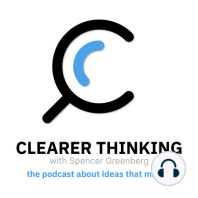100 min listen

The FTX catastrophe (with Byrne Hobart, Vipul Naik, Maomao Hu, Marcus Abramovich, and Ozzie Gooen)
The FTX catastrophe (with Byrne Hobart, Vipul Naik, Maomao Hu, Marcus Abramovich, and Ozzie Gooen)
ratings:
Length:
205 minutes
Released:
Nov 28, 2022
Format:
Podcast episode
Description
What the heck happened with FTX and Sam Bankman-Fried? Were there early warning signs that most people failed to notice? What could've been done differently, and by whom? What effects will this have on the EA movement going forward?Byrne Hobart Byrne Hobart writes The Diff, a newsletter covering inflections in finance and tech, which has 47,000+ readers. Previously he worked at a hedge fund covering Internet and media companies. Follow Byrne on Twitter at @ByrneHobart or subscribe to The Diff at thediff.co.Vipul Naik holds a PhD in mathematics from the University of Chicago and is currently the head of data science at Equator Therapeutics, a drug discovery startup. He previously worked at a tech startup called LiftIgniter and then at The Arena Group, a media / tech company that acquired LiftIgniter. Learn more about him at his website, vipulnaik.com.Maomao Hu is a blockchain, fintech, and AI entrepreneur and thought leader. He has been involved in organizations ranging from leading investment banks to new startups, to solve both microstructure problems like market surveillance and macrostructure problems like capital allocation. Currently, he leads development and quantitative research at asset manager Zerocap. Learn more about him at his website, thefirenexttime.com.Marcus Abramovich is a managing partner at Enlightenment Ventures, an EA-aligned cryptocurrency hedge fund. Marcus also leads a Facebook group and Discord community of effective altruists focused on accumulating capital to donate to EA causes, and advises several cryptocurrency projects. Marcus discovered effective altruism as a PhD candidate at the University of Waterloo and professional poker player. Email him at marcus.s.abramovitch@gmail.com.Ozzie Gooen is the president of The Quantified Uncertainty Research Institute. He has a background in programming and research. He previously founded Guesstimate and worked at the Future of Humanity Institute at Oxford. Follow him on Twitter at @ozziegooen or learn more about his current work at quantifieduncertainty.org.
Released:
Nov 28, 2022
Format:
Podcast episode
Titles in the series (100)
Antagonistic Learning and Civilization with Duncan Sabien by Clearer Thinking with Spencer Greenberg